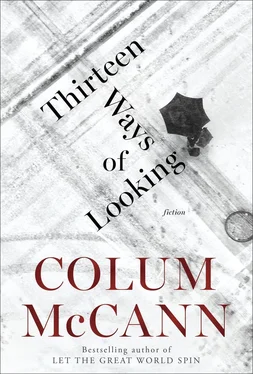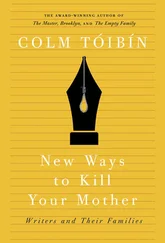A swell of revulsion stabs her stomach and she sways, dizzy with regret.
Inside, she locks the door, puts her head against the frame. Is this what awaits me, Lord? Is this where I finish? Is this where You have led me?
There is a flick of shadow at the top of the stairs. A creak. Flecks of light ordering and reordering themselves. She moves through the darkened living room, grabs ahold of the banisters.
Sister Anne is sitting in the middle of the stairs in her dressing gown and slippers. No disapproval in the broad pale expanse of her forehead. No tightening of the lips. No shake of her head.
— Can’t sleep?
— I’m just fidgety.
Beverly is well aware of the pungency of the cigarette. She pulls her breath in, turns to the wall, squeezes herself past the staircase mirror. Her face is lean and spectral, her neck striated.
— You know, Beverly, that I am here at any stage, if you need to talk.
— Of course.
— We are, in large measure, the prayers we share.
She turns quickly from her reflection, pauses at the top of the stairs in the red light from the Sacred Heart.
— Actually, I was thinking of making a little journey.
— Sorry?
— London. I was thinking of making a little journey to London.
A surge of panic: it is an idea so sudden and unplanned that she feels as if she has been sideswiped by her own shadow.
— Why ever so?
A cellar, an airless place, a mineshaft, a caterpillar crawl, a chain across the floor, a single bead of light underneath the door.
— I have a brother there.
— But you only just got here. Didn’t the doctors say that you need to rest?
To bend, to shape, to break the truth. Have I become the liar I never wanted to become? Why not tell Sister Anne that she has just, quite simply, been knocked off balance? That she has seen a man she knew long ago? That he has resurfaced? That she must affirm it is him? That he is representing himself as a man of peace? That he is there in London now? That she must leave? That this is all she now knows, all she can tell?
— Is anything the matter with him?
— Sorry?
— Is something the matter with your brother?
— He’s ill.
To survive one mistake she has committed herself to the next and then the next. She shifts her foot slightly on the stair.
As a child, her brother spent a year in bed with spinal tuberculosis. His room was full of crystals, coils, wires: he taught himself how to build model radios. He was six years younger than her, but she sat by his bed with him, listening to the chatter of ships from out on the Atlantic. Years later she wrote him letters, once a week, until he, too, left — first for Dublin, then Edinburgh, until he drifted down to London to review literature for the BBC. They fell into that life of distant brother and sister: the yearly Christmas cards, the occasional phone calls, the funerals of their parents. Drifting farther still until she was kidnapped. He had organized petitions for her then. Marches on the Dáil, the House of Commons, the Colombian embassy. Afterward he wanted to make the radio documentary about what had happened to her, but she couldn’t do it. They chained you? They beat you with a wooden board? They kept you locked up in a room? They fed you from a metal dish? Paralyzed by the truth. He allowed her the silence. They fell into the old patterns again, talking once or twice a year, not so much out of neglect or embarrassment, but simply because that’s how it seemed families worked, their seepage.
— He’s ill, you say?
— Yes.
— Is he a smoker then too?
There is no malice in Sister Anne’s question, but it stings her. So, you were watching me? You opened your curtains and the light fell on the lawn? You saw me reach into the coffee can? You smelled the smoke drifting up to your room? Have I become hostage yet again? Is this where I end up, after all these years? A room on Long Island, at the end of the continent, the water cresting silently against the shore?
— He’ll be in my prayers.
— You’re very kind.
— You’ll have to get permission from your Order.
— They will pray alongside me, I’m sure.
— God measures us. He truly does.
— Yes, He does.
— Is there anything else you need to tell me, Beverly?
He put a chain around my neck. He ripped my breast. He violated me.
— No, she says, stepping through the guttering red light, along the landing. She pauses a moment at her door, leans against the frame, hears the click of Sister Anne’s door.
The house falls quiet and the shadows fold down, dark.
2
Victoria Station. A crush of faces. A salmon-along of tourists. Her long skirt brushes the floor. Her suitcase has no wheels and the handle is unhinged so that she has to drag it behind her, reluctant, unwieldy. She would like a moment’s respite. To sit down and take the weight off her legs. Find a refuge. A traveler’s chapel maybe, or a small café with a quiet corner.
She is startled by a pigeon flapping along past a piano. The piano is, it seems, an art project, left in the train station for anyone to play.
The pigeon hovers, then lands a moment on the lid, walks along the beveled edge.
At a food stall Beverly buys herself a croissant and a cup of tea in a paper cup. Awful to drink tea from paper, the little tab of the teabag hanging down. There is nowhere to sit, so she drifts across to the piano, perches on the edge of the bench.
A pulsing pain in her lower back. The journey has been arduous, a two-hour delay in JFK, a runway incident in Heathrow, the wrong direction on the tube from Paddington — she was woken only when she got to the end of the line.
The pigeon returns and pecks at her feet. It is, she notices, extraordinarily fat, the color of a thing into which no color goes. How odd to think that it might live inside the station, a nest in the rafters, its whole life without a tree of any sort.
She lays her head against the lacquered edge of the piano and is shaken awake moments later by a pale young boy whose mother stands nearby, vaguely apologetic, wanting to play. For a moment she cannot recall where she is, or how she has gotten here.
— Don’t forget your tea, Missus.
She pats the young boy on the head. A blessing upon him. Used to be, long ago, we could make the sign of the cross. Gone, those days. Maybe just as well: who knows what the mother might say if she attempted to bless the child?
Outside the light pours down hard and clear and yellow. The tea has grown tepid but she drains the last mouthful anyway. No rubbish can in sight. She crumples the cup and stuffs it in her cardigan pocket, moves toward the taxi line, nudging the suitcase along.
From a distance she is sure she hears the faint rumor of the piano: the boy is confident and agile beyond his years.
She nudges forward in the queue, pats her cardigan pocket, flicks through her passport, searching for her brother’s address. A ticket stub, a few receipts, nothing else. Lord, help me now. I must find his address. Near Victoria Station. I remember that.
She lays the suitcase flat on the ground, thumbs open the steel lock. Three dresses, an overcoat, a change of shoes, a Thomas Merton book, a biography of the new Pope. An acute wave of helplessness sweeps over her, a nausea that begins in the pit of her stomach, rises and spreads.
— You all right there?
There is a tattoo at the collar of the taxi driver’s shirt, the extension of a vine or a bramble of some sort. She flips the suitcase closed, snaps the locks, pushes down on the lid to keep herself from toppling forward, stands shakily.
He gazes up at her with mild alarm. She is a full head and shoulders taller than him. If she were to fall she might topple him.
Читать дальше












